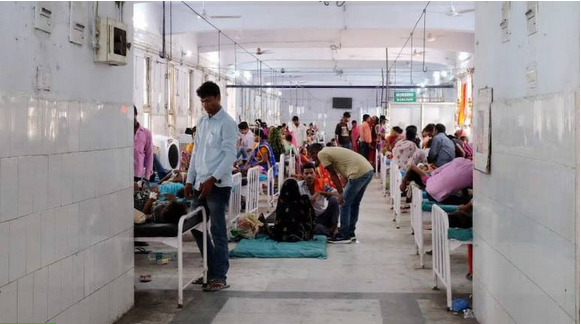In Karnataka, healthcare accessibility remains a critical concern. A recent report by the Federation of Indian Chambers of Commerce and Industry (FICCI), in collaboration with the state government, sheds light on the significant shortage of medical professionals and primary health centres (PHCs) across 30 districts in Karnataka.
The FICCI report reveals that Bengaluru Urban, Belagavi, Mysuru, Tumakuru, Hassan, and Mandya collectively contribute to 39.1% of the nursing personnel shortage. This staff shortage in specific districts highlights the uneven distribution of medical professionals, leading to disparities in healthcare accessibility. To achieve holistic healthcare, it is crucial to address these regional imbalances and ensure that both urban and rural areas have equal access to medical resources.
Shortage of Medical Personnel: The shortage of medical personnel in Karnataka amounts to approximately 16,500 employees, posing a significant challenge to the state's healthcare system. This deficit not only impacts the quality of healthcare services but also places a considerable burden on the existing staff. Bengaluru Urban and other key districts facing nursing shortages demand the urgent need for targeted recruitment strategies and retention efforts.
Insufficient Primary Health Centres (PHCs): The FICCI report brings attention to the shortage of PHCs across Karnataka, with 454 centres (245 urban and 209 rural centres) facing deficits. While urban areas benefit from relatively better medical infrastructure, rural regions continue to experience shortages, hindering access to primary and secondary healthcare facilities. The establishment of more PHCs, especially in rural areas, is imperative to ensure comprehensive healthcare coverage for all residents.
Challenges in Recruitment and Retention: Dr. BL Sujatha Rathod, Director of Medical Education, emphasizes that institutions often recruit for the minimum-sanctioned posts according to the National Medical Council's (NMC) standards. However, these positions remain vacant, contributing to the staff shortage. The report highlights the strain on existing medical personnel who end up working longer hours, adversely affecting their mental health and the quality of healthcare services provided.
Recommendations for Improvement: To address these healthcare challenges, the FICCI report suggests a multifaceted approach:
1. Setting up Multidisciplinary Hospitals: The report recommends the establishment of 500-bed multidisciplinary hospitals across the state. This strategic move aims to attract medical professionals to work in smaller towns, reducing the migration of healthcare workers to larger cities. This not only addresses staff shortages but also enhances healthcare accessibility in underserved areas.
2. Universal Health Coverage: Experts stress the importance of achieving universal health coverage. This involves creating a healthcare system that ensures access to essential services for all residents, regardless of their geographic location or socio-economic status. Universal health coverage is a key component of building an inclusive healthcare system.
3. Preventive Healthcare System: The state must prioritize the development of a preventive healthcare system that focuses on early detection and intervention. By emphasizing preventive measures, Karnataka can reduce the burden on its healthcare infrastructure and improve overall health outcomes.
4. Increased Budget Allocation: Experts recommend an increased budget allocation for the healthcare sector. This funding can be utilized to address human resource shortages, improve medical infrastructure with the latest technology, and implement comprehensive healthcare initiatives effectively.
The FICCI report serves as a crucial resource for understanding the healthcare landscape in Karnataka and identifying key areas for improvement. By addressing the shortage of medical personnel, enhancing primary health centres, and implementing strategic recommendations, the state can move closer to its mission of achieving a $1 trillion economy while ensuring the well-being of its residents. The collaborative efforts of the government, healthcare institutions, and stakeholders are essential to building a robust and inclusive healthcare system in Karnataka
http://www.21stcenturyhospitalgownplus.com/
http://www.elite-factory-15.fr/
http://www.gba-amateurboxen.de/
http://www.kita-strausberg.de/
http://sonispicehelensburgh.co.uk/
http://curryzonecardonald.co.uk/
http://cinnamon-edinburgh.co.uk/
http://www.bombaydelipaisley.com/
http://pizzanightclydebank.co.uk/
http://www.pizzanightclydebank.com/
http://gyros2goclydebank.co.uk/
http://grillicious-glasgow.co.uk/
http://www.abdulstakeaway.com/
http://www.freddiesfoodclub.com/
http://cinnamonportobello.co.uk/
http://www.romafishnchips.com/
http://bombaydelipaisley.co.uk/
http://yaraloungerestaurant.co.uk/
http://tasteofchinacoatbridge.co.uk/
http://www.memoriesofindiagorebridge.com/
http://memoriesofindiaeh23.co.uk/
http://freddiesknightswood.co.uk/
http://gyros2gohardgate.co.uk/
http://www.strausseeschwimmen.de/
http://www.janstanislawwojciechowski.pl/
http://london-takeaways.co.uk/
http://shahimanziledinburgh.co.uk/
http://freddiesfoodclub.co.uk/
http://www.spicestakeaway.com/
http://www.mexita-paisley.com/
http://pandahouseglasgow.co.uk/
http://www.zum-alten-steuerhaus.de/
http://www.oberstufenzentrum-mol.org/
http://www.morsteins-neuenhagen.de/
http://www.maerkische-jugendweihe.de/
http://www.planungsbuero-henschel.de/
http://www.hertzelektronik.de/
http://www.militaergefaengnisschwedt.de/
http://www.fahrrad-naumann.de/
http://www.hondamoto-villemomble.com/
http://www.hondamoto-royan.com/
http://www.hondamoto-ajaccio.com/
http://www.download-skycs.com/
http://www.sisakoskameleon.hu/
http://www.hondamoto-montauban.com/
http://www.hondamoto-chalonsursaone.com/
http://www.hondamoto-champignysurmarne.com/
http://www.hondamoto-asnieres.com/
http://www.pasquier-motos.com/
http://www.evacollegeofayurved.com/
http://www.compro-oro-italia.it/
http://www.hondamoto-saintmaximin.com/
http://www.hoangminhceramics.com/
http://www.pasiekaambrozja.pl/
http://www.xn--b1alildct.xn--p1ai/
http://www.ferreteriaflorencia.com/
http://www.thevichotelkisumu.com/
http://www.nexuscollection.com/
http://www.moitruongminhhuy.com/
http://www.ozkayalarpaslanmaz.com/
http://www.munkagepmonitor.hu/
http://www.my247webhosting.com/
http://www.thesmokingribs.com/
http://www.healthlabgrosseto.it/
http://www.ochranakaroserie.cz/
http://www.phukiendonginox.com/
http://www.meijersautomotive.nl/
http://www.kartaestudentit.al/
http://www.podlahyjihlavsko.cz/
http://www.hillhouseequestrian.com/
http://www.gradskapivnicacitadela.com/
http://www.capella-amadeus.de/
http://www.landfleischerei-auris.de/
http://www.faistesvacances.be/
http://www.autoservice-doernbrack.de/
http://www.tabakhaus-durek.de/
http://www.oldtimer-strausberg.de/
http://www.imexsocarauctions.com/
http://www.kaslikworkshop.com/
http://www.firefightercpr.com/
http://www.visuallearningsys.com/
http://www.hanksautowreckers.com/
http://www.impresospichardo.com/
http://www.philiphydraulics.net/
http://www.internationaldentalimplantassociation.com/
http://www.indywoodtalenthunt.com/
http://www.badicecreamgame.com/
http://www.riad-amarrakech.com/
http://www.centrodeformacioncanario.com/
http://www.socialdefender.com/
http://www.pepiniere-paravegetal.com/
http://www.reparertelephonearles.fr/
http://www.namsontrongdoi.com/
http://www.devipujakjivansathiseva.in/
http://www.laymissionhelpers.org/
http://www.vangiaphatdeco.com/
http://www.isscoachinglucknow.in/
http://www.hieuchuandoluong.com/
http://www.aurorabienesraices.com/
http://www.indianmoversassociation.com/
http://www.oztopraklarotomotiv.com/
http://moitruongnamnhat.com.vn/
http://www.dienmayvinhthuan.vn/
http://www.divadelkoproskoly.cz/
http://www.xn--12cfje1df4hdl7f1bf2evg9e.com/
http://www.westernirontrailers.com/
http://www.jazzaufildeloise.fr/
http://www.signcraft-drone.com/
http://www.realtyhighvision.com/
http://www.thermexscandinavia.nl/
http://imobiliariafelipe.com.br/
http://www.salon-lindenoase.de/
http://www.jezirka-zahrada.cz/
http://www.singhanialogistics.in/
http://www.der-pixelmischer.de/
http://www.hegermuehlen-grundschule.de/
http://www.radiologie-strausberg.de/
http://www.foto-studio-matte.de/
http://www.tables-multiplication.com/
http://www.rusztowania-belchatow.pl/
http://www.fishingandhuntingheaven.com/
http://www.orologiegioiellilameridiana.it/
http://www.rotarybresciaest.org/
http://www.jacarandaspain.com/
http://www.javieririberri.com/
http://www.huebelschraenzer.ch/
http://www.illinoiscreditunionjobs.com/
http://www.iznikdenizorganizasyon.com/
http://www.leasebackconcierge.com/
http://www.eoisantacoloma.org/
http://skullbasesurgery.co.uk/
http://www.immobilienplattensee.com/
http://www.germandailynews.com/
http://www.gptdcinternational.com/
http://www.forklifttrainingedmonton.com/
http://www.kashiwanakayama-cl.com/
http://www.thehousemediagroup.com/
http://www.pensiimaramures.ro/
http://www.michaelakokesova.cz/
http://www.viswabrahmanaeducationaltrust.com/
http://krone-aluminium.com.pl/
http://www.broadwaylumber.com/
http://www.ambulancesoccasions.com/
http://www.continuumintegrated.com/
http://www.joilifemarketing.com/
http://www.rotaseydisehir.com/

 The collaborative efforts of the government, healthcare institutions, and stakeholders are essential to building a robust and inclusive healthcare system in Karnataka.
The collaborative efforts of the government, healthcare institutions, and stakeholders are essential to building a robust and inclusive healthcare system in Karnataka.










.jpeg)


.jpeg)
.jpeg)
.jpeg)
_(1).jpeg)

_(1)_(1)_(1).jpeg)
.jpeg)
.jpeg)
.jpeg)








.jpeg)
.jpeg)